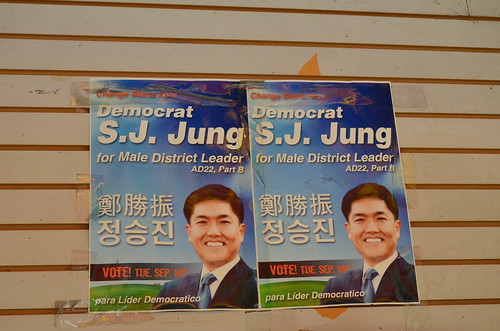Most people know what first generation and second generation means when it comes to immigration. For the Chinese, first generation immigrants are those who come to the U.S. and become a citizen usually in their 30s or 40s. Second generations are their children — those who are born in the U.S. with immigrant parents. But what about 1.5? Chen En, who was born in Fujian Province, China, and moved to the U.S. as a child, is among those who consider themselves the “1.5” generation – those born there but raised mostly here and so have a foot in both worlds.
En moved to Flushing, Queens from China when he was 7 years old. His parents chose Flushing because it was an emerging Chinatown, and more importantly, it has good schools for immigrants. Like many other Chinese parents, En’s mom and dad sent him to I.S. 237 and J.H.S.189, schools famous for large population of Chinese students. “They are schools for new immigrants,” said En. “They give good education, and you could speak Chinese a little bit with your schoolmates and teachers.”
Like a soft landing, En said he felt “relieved” in schools like that. “Flushing is a good place to start with,” he explained. “You don’t need to worry about language, you have lots of restaurants to choose, you just feel there is a close Chinese community there.”
Indeed, in the last 20 years, the Chinese community has become a big one in Flushing. According to September data released by New York State controller Tom DiNapoli, more than 40 percent of residents, or 70,000 people, in Flushing are Chinese. The growth rate of the Chinese community in Flushing over the last decade has made it the largest Chinese community in New York City, exceeding Manhattan’s Chinatown. But unlike Chinatown, which is densely populated by Cantonese and Fujianese immigrants, Flushing has residents from all over China. “We have Beijingers, Shanghainese, people from Sichuan, and anywhere else in China,” boasts En. “One good thing is you can find restaurants from all these places. That makes Flushing really attractive to new immigrants. ”
But while Flushing offers attractive schools, food choices, and community to new Chinese immigrants, often what does not make the list of concerns is politics.
“I don’t care about politics,” said Jack Lee, 33, a Flushing resident. “It rarely affects my life.” Lee, moved to the U.S. from Henan Province, China in 1990 when he was 12. With a bachelor degree in Computer Science from NYU, he has a decent life with a good job at a high-tech company. For him, like many of the 1.5 generation surviving is always the priority “I need to get myself into American society and new life here, I have to work very hard, so there is really little energy left for politics, or particularly, voting.”
Among Chinese immigrants the enthusiasm for voting is low. Like many other immigrants in Flushing, Lee will only show up to vote every 4 years for whoever is the Democratic presidential candidate. “I feel Democrats will treat immigrants more nicely,” said Lee. As for local elections like the one for US congressman or city council members, Lee admits: “I don’t care, their name just won’t come into my life.”
The names, as for the public officials in Flushing, would be Democratic Assemblywoman Grace Meng and Republican City Councilman Peter Koo. They have been active in the district in terms of serving the public, but constantly they fail to get residents to vote for the “minor elections”. In the last special election for New York’s 9th congressional district, which includes Flushing, on September 13, many polling station saw only one Chinese American voter.
Although there may be language issues, part of the lack of political interest is really cultural. Chen Daming, 24, who is also a 1.5 generation, said that Chinese immigrants in Flushing prefer help from “Acquaintances Society” rather than politicians. “Acquaintances Society is simple, you help me, so I help you; others, we don’t care and we don’t expect their help,” Daming said. “We are just very realistic, election, voting, public representatives they are all good ideas, but for us the other way is safer.”
As new immigrants, people like Daming will pay much more attention to sticking with people who come from the same province, the same city or even the same village. They feel empowered by the isolation created by these networks. They trust people from the same civil society more than people in uniforms. Thus getting to know people from say the Fukien Benevolent Association, the largest Chinese civil group in Flushing, or similar civil groups, who take care of issues from immigration status to health care to tax concerns, is the only politics that matter.
This lack of interest in politics may also be in part generational, that is almost what it means to be a 1.5 generation. At this point in the community’s immigration story, “settling down” in their new home is what they do care. En works in a Laser Engineering company on Long Island, every morning he needs to drive for about 50 minutes to work; Daming takes subway and commute 40 minutes to his office in midtown Manhattan. Like many other 1.5 generations in Flushing, they work very hard every weekday and go to KTV bars – where they sing Karaoke with friends – to have fun on weekends.
“You will always be marginalized,” said En who although he has adjusted well to life in the US still has deep roots in China. But, he added, “Hope should come from the second generation; they are born here, they know American politics. So in their late 20s or 30s when they need to worry about medical insurance or other issues, you will hear their voice.”

